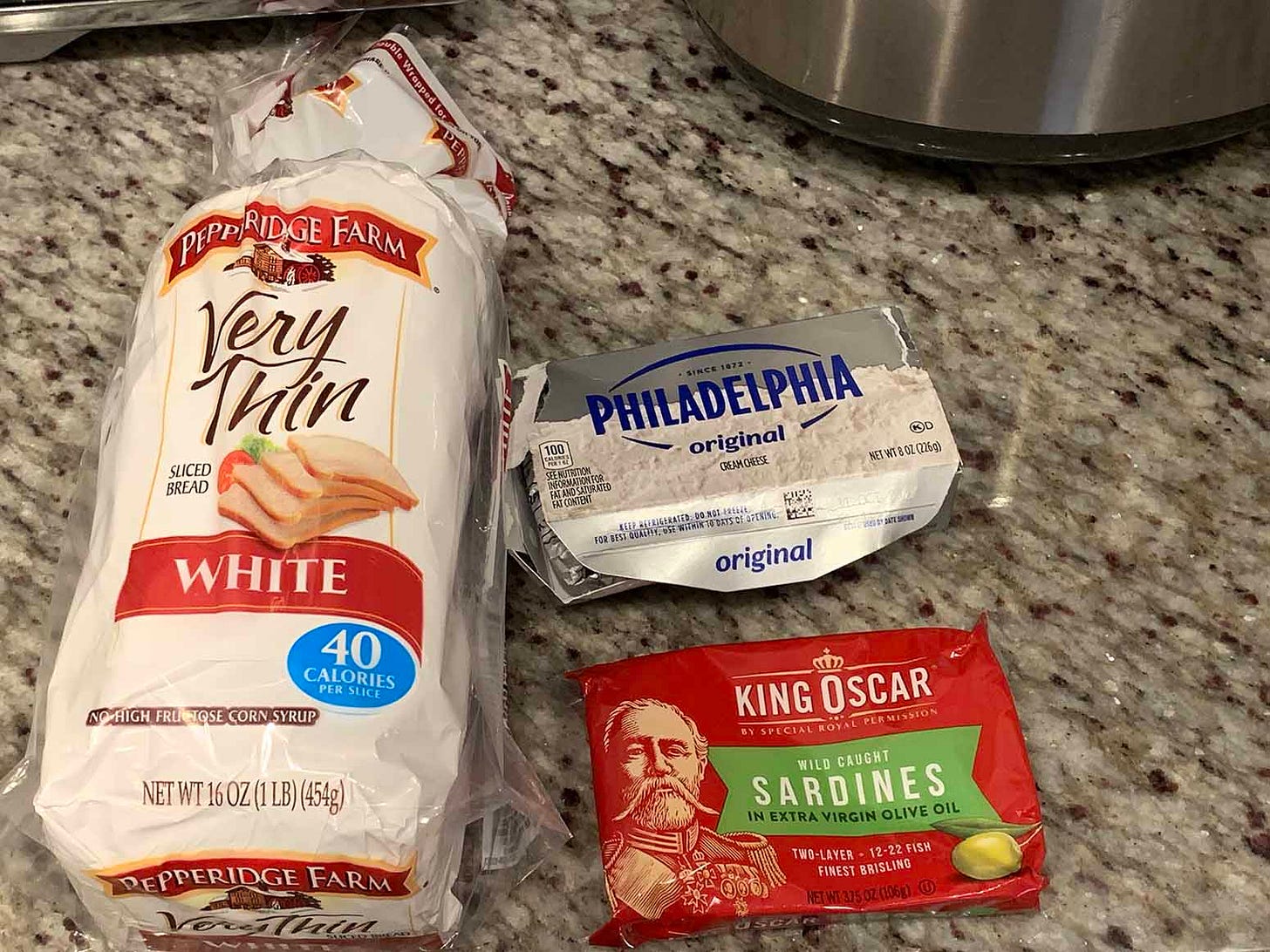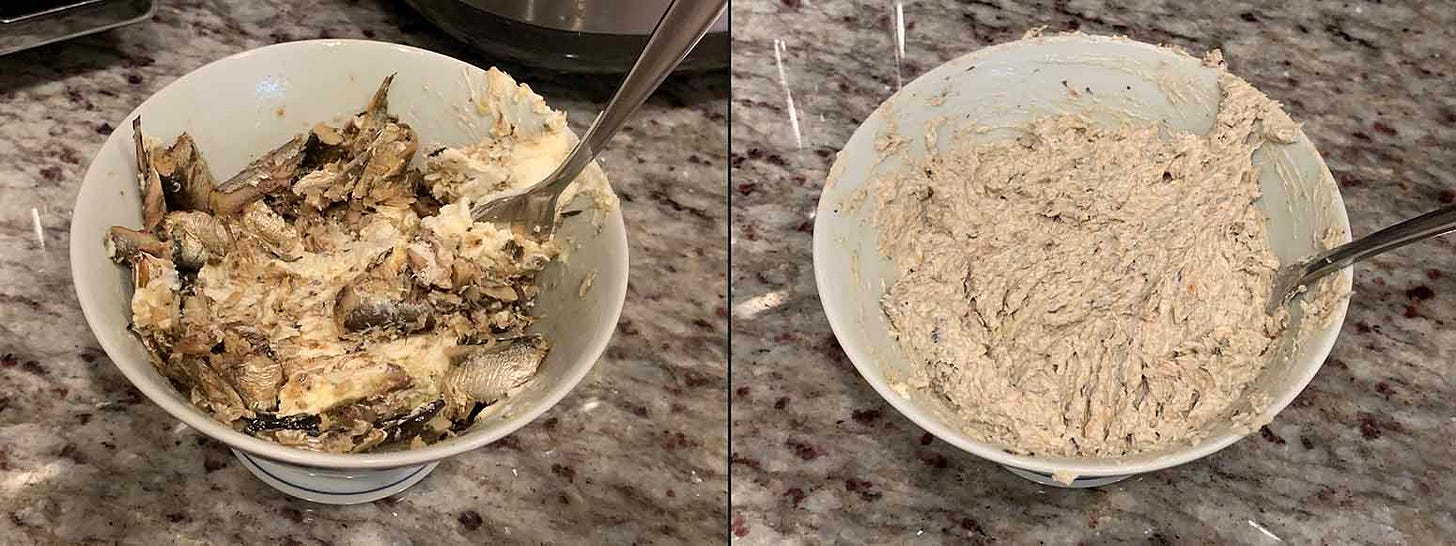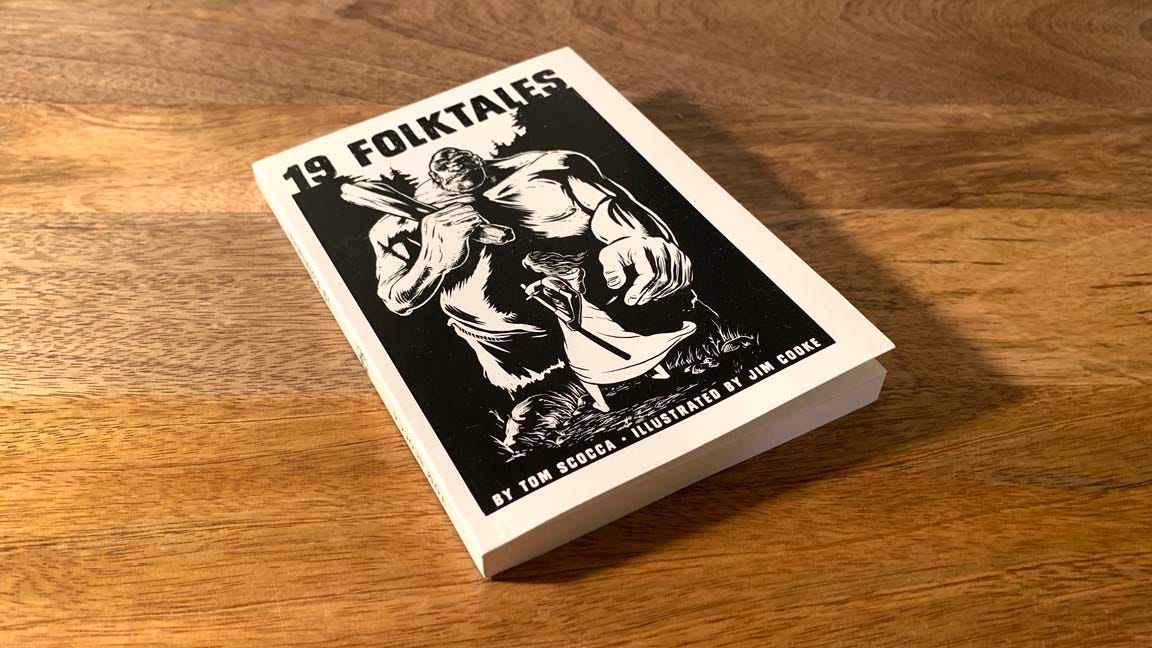APPLIED RECIPE DEPARTMENT
A Test of the Difference Between Sardines and Goose Liver
I KNEW THE mock pâté de foie gras sandwich wasn't going to taste like pâté de foie gras. Intrigued as I was by the promise of Ellye Howe Glover, aka "Dame Curtsey," delivered more than a century ago and carried down to us through the public domain, that "boned and skinned sardines and cream cheese, mashed to a pulp together, produce a combination which tastes almost exactly like goose-liver paté," I didn't believe her for a second. Not literally.
Implausible though it was as a concept, however, it was highly realistic as a project. There were King Oscar brisling sardines in the pantry and there was a half-used package of Philadelphia cream cheese in the fridge, and that was all the recipe required. Also two people were at home and needed lunch, and there was only enough leftover fried rice for one of us. It was time to listen to Dame Curtsey.
The question looming over any experimental archival sandwich project is "What are you stuck with if it doesn't work?" and here the answer seemed safe and fine: if the alchemy of 1909 cookery did, indeed, fail to turn it into a near-perfect substitute for fattened goose liver, I would still have preserved fish blended into cream cheese, an extremely normal and well-established thing to eat on toast.
I used the kitchen scale to match up the 3.75 ounces of sardines—more like 3 3/8 oz. when they were drained—in a bowl with about the same amount of cream cheese, as instructed. I only ever buy sardines with skin and bones attached, and I was not disposed to operate on a bunch of tiny sardines just because someone at the turn of the last century preferred them skinless and boneless. I scraped a little skin loose from one of the fish with the tip of a steak knife, just to confirm there was no way I would really do it.
The recipe called for "entire wheat bread," but I didn't have any. I had a loaf of ultra-thin Pepperidge Farm white bread I'd grabbed while buying trash bags at the neighborhood market, because so many of the archaic sandwiches insist on dainty slices, so I toasted two slices of that instead. And I still had most of a giant bunch of scallions I'd bought, twine-bound and untrimmed, at the Saturday farmer's market, so I chopped some scallions up as a garnish, on the grounds that scallions obviously go with fish-and-cream-cheese spread.
Owing to the fact that we were still coming out of a hot-water crisis in the building, all I could find in the silverware drawer to mash with were the tiniest dessert forks. The mashing was not easy: the cream cheese was stiff and dense, and it was hard to drive the easily fragmented fish down into it. Also (owing, again, to the hot-water crisis) I was doing the mashing in a bowl that was a little too small.
Eventually I gave up and got ready to hand-wash a bigger and sturdier fork, only to notice that there were some clean ones already hand-washed in the basket of the drainboard. I switched to one of those and immediately started making real progress. The rough blend of white cheese and dark gray fish bits became a fairly smooth paste, in light gray.
I found a clean butter knife on the drainboard and spread the paste on one of the little pieces of toast to make an open-faced sandwich. A stray fleck got on my finger and I licked it off. It tasted exactly like fish and nothing like goose liver.
I ate the first slice straight, ungarnished. The taste remained the taste of sardines. Maybe using skinless and boneless fish would have lessened the fishiness, but it was hard to imagine it would have made any sort of fundamental change. Sardine essence is stubborn and pure.
However! The texture! Fully mashed into the cream cheese, the oily sardine meat had joined it to produce a silky softness that was nothing like the texture of sardine salad—that was, in fact, remarkably close to the melting mouthfeel of goose pâté. Part of Dame Curtsey's alchemy had really worked!
I ate the second slice with scallions on top of the mock pate. Really, what this belonged on was not fine-sliced white bread or entire wheat bread but an everything bagel. We had used up the frozen everything bagels, though, and I'd neglected to order more. For the third slice, I settled for toasted rye, with more scallions. Not luxurious, but worth repeating.
(The next day, I had the leftovers on rye with thinly sliced raw yellow onion, rather than scallions, because the petite white bread had convinced me to also make little tomato-and-onion summer sandwiches—not from archaic recipes but from family tradition: beefsteak tomato, onion, salt, pepper, and mayo on toast. On the mock pate, the raw onion brought things even closer to tasting like a brunch standard than the scallions had.)
PLATFORM-BASED ERRATUM DEP'T.
IN YESTERDAY'S ITEM proposing the replacement of our ever-more-unusable present-day internet with the contents of the Wayback Machine from Archive.org, some of those contents were inaccessible to some readers.
Thanks to the way our host platform, Substack, tracks user behavior, people who clicked what was supposed to be a link to the URL
https://web.archive.org/web/20091122151742/https://www.theawl.com/2009/11/how-to-cook-a-fucking-steak were redirected to that same URL with the additional text
?utm_source=substack&utm_medium=emailtacked onto the end, which led not to Alex Balk's 2009 essay "How to Cook a Fucking Steak," but to an Archive.org error message, since the original archived story URL had not contained any reference to "source=substack" or "medium=email." The contemporary internet is so broken, it made it impossible to reach the non-broken internet of the past.
Because the error was built into Substack's link-handling protocol, and because the link had been delivered via email, there was no real way to push out a correction to the link that would have worked. If you want to read "How to Cook a Fucking Steak," as originally published on The Awl, please paste the text
https://web.archive.org/web/20091122151742/https://www.theawl.com/2009/11/how-to-cook-a-fucking-steakinto your browser. Indignity regrets the error and the hassle.
WEATHER REVIEWS
New York City, July 17, 2023
★★ The humidity came down slowly through the morning; the temperature went up quickly. Even for a short spell out on the balcony, there was no way to pretend the results were enjoyable. By 2:30 the humidity was decently down to 46 percent, but the temperature had rocketed to 88. The wildfire smoke was inbound again; the afternoon sky around the sun was the color of bone and the slanting light was resinous, on its way to amber. A helicopter sent a near-palpable pulse of noise down through the already re-thickening air. The grass on the Great Hill was thick as a deep-pile carpet, decoratively speckled with clover. Frond-y plants grew on the downslope in clusters in the shadowed patches where an oak tree's limbs drooped almost to the ground. Joggers were out but moving slowly. Scooter- and ebike-riders had wheeled their rides off the path to rest in the shade. Egrets flapped eastward over Central Park West.
EASY LISTENING DEP’T.
SANDWICH RECIPES DEP’T.
WE PRESENT INSTRUCTIONS for the assembly of select sandwiches from "Dame Curtsey's" Book of Recipes, by Ellye Howell Glover, Author of “Dame Curtsey’s” Book of Novel Entertainments, etc. Published in 1909, this book is in the Public Domain and available at archive.org for the delectation of all.
Delicious Hot Cream Chicken Sandwiches
CHOP cold cooked chicken very fine; to each pint allow a teaspoonful of salt and a dash of red pepper; spread this in a thick layer over buttered bread, and just at serving time put in the centre of the chicken a spoonful of nicely made cream gravy.
Sandwich Ham
AFTER boiling a piece of ham, the short shank end is generally stringy and often wasted. If this is passed twice through a meat chopper and then mixed with a little sweet cream it makes ham which is excellent for sandwiches.
If you decide to prepare and attempt to enjoy a sandwich inspired by this offering, kindly send a picture to us at indignity@indignity.net.
MARKETING DEP'T.
19 FOLKTALES collects a series of timeless tales of canny animals, foolish people, monsters, magic, ambition, adventure, glory, failure, inexorable death, and ripe fruits and vegetables. Written by Tom Scocca and richly illustrated by Jim Cooke, these fables stand at the crossroads of wisdom and absurdity.
HMM WEEKLY MINI-ZINE, Subject: GAME SHOW, Joe MacLeod’s account of his Total Experience of a Journey Into Television, expanded from the original published account found here at Hmm Daily. The special MINI ZINE features other viewpoints related to an appearance on, at, and inside the teevee game show Who Wants to Be A Millionaire. Your $20 plus shipping and tax helps fund The Brick House collective, a Publishing Concern featuring a globally diverse set of publishers doing their own thing, with interesting items and publications available for purchase at SHOPULA. This all goes to help the Brick House collective continue to be an independent alliance and not depend on Advertisers or a Billionaire who wants to be the president of Twitter. Thank you.
Thanks for reading INDIGNITY, a general-interest publication for a discerning and self-selected audience. We depend on your support!












